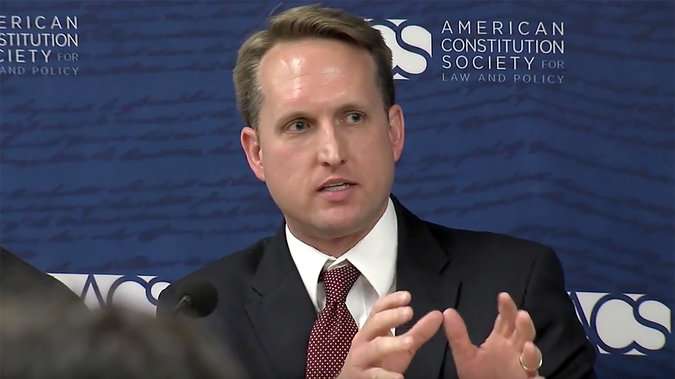|
|
本帖最后由 casper 于 2017-8-3 13:53 编辑
美国之音/苹果日报
华盛顿 —— 据报道,美国司法部的备忘录要求律师起诉针对白人申请学生“蓄意基于种族歧视”的行为。
《纽约时报》星期二引述司法部的一份文件报道,美国司法部计划对歧视白人申请者的招生政策展开调查,并可能起诉相关大学。
纽约时报的报道说,司法部的内部备忘录要求下属民权部门寻找有意向为这个名为“与大学招生中蓄意基于种族歧视行为的相关调查和可能起诉”的新项目工作的律师,负责调查学院及大学校园审核申请入学新生时,蓄意以种族为依据的歧视行为,以及可能衍生的诉讼问题。
有人认为,美国一些大学实行的“平权法案招生政策”侧重录取少数族群,从而变相地歧视了白人申请学生。
《纽约时报》的报道还说,该文件建议该项目由司法部民权部门的政治任命官员负责,而不是由负责受教育机会部门的职业文官来经手。
这份备忘录文件虽然没有明确指出司法部认为哪些大学因“平权法案招生政策”涉嫌种族歧视,但文件所使用的“蓄意基于种族的歧视”这个措辞,明显是针对那些鼓励招收更多少数族裔学生的大学,同时针对那些侧重录取黑人及拉丁裔等少数族裔社区学生的招生计划,使得少数族裔享有比其他具有等同成绩甚至更高成绩的申请者更大的录取优势。
美国最高法院裁定,大学可以使用平权招生政策,给予少数族裔申请者一定的优势进入大学学习。不过,最高法院拒绝种族配额的做法,表示在评估申请者资格的诸多因素中,种族因素只能作为因素之一。
报道指出,这个项目再次证明川普总统和司法部长塞申斯正让民权部门变得趋于保守化。
曾在里根总统时期的美国民权部门担任过高级官员的罗杰·克莱格认为,由于美国正在愈发成为为一个多种族国家,因此他欢迎川普政府的这个新项目。他表示,民权法案主旨是保护每个人免受歧视,但现在经常出现的现象是,不仅白人申请者受到歧视,属少数族裔的亚裔美国人申请者也受到歧视。
他还建议,该项目应该在学生团体内分析不同种族群体的考试成绩和辍学率之间的差距,这将会证明大学的招生办在招生上过于强调申请人的种族。
司法部拒绝透露该计划的更多细节。
纽约时报
据纽约时报报道,川普的司法部将调查在大学录取中的强制优待措施(即AA)。目前,在司法部的Civil Rights部门,一份内部的通知正在传阅,他们在寻求对一个新项目感兴趣的律师们。对大学录取内部的歧视白人孩子的行为进行调查和可能的诉讼。律师们可以在8月9号之前报名。值得注意的是,该项目将直接由Civil Rights部门的主要办公室直接出击,相关人员由川普政府任命,而不是由通常的教育机会部门(Educational Opportunities Section)负责,后者常常会处理和学校相关的事务。可见川普政府对此的重视。
Justice Dept. to Take On Affirmative Action in College Admissions
By CHARLIE SAVAGEAUG. 1, 2017

President Trump and Attorney General Jeff Sessions have helped tilt the Justice Department to the right on civil rights issues. Credit Doug Mills/The New York Times
WASHINGTON — The Trump administration is preparing to redirect resources of the Justice Department’s civil rights division toward investigating and suing universities over affirmative action admissions policies deemed to discriminate against white applicants, according to a document obtained by The New York Times.
The document, an internal announcement to the civil rights division, seeks current lawyers interested in working for a new project on “investigations and possible litigation related to intentional race-based discrimination in college and university admissions.”
The announcement suggests that the project will be run out of the division’s front office, where the Trump administration’s political appointees work, rather than its Educational Opportunities Section, which is run by career civil servants and normally handles work involving schools and universities.
The document does not explicitly identify whom the Justice Department considers at risk of discrimination because of affirmative action admissions policies. But the phrasing it uses, “intentional race-based discrimination,” cuts to the heart of programs designed to bring more minority students to university campuses.
Supporters and critics of the project said it was clearly targeting admissions programs that can give members of generally disadvantaged groups, like black and Latino students, an edge over other applicants with comparable or higher test scores.
The project is another sign that the civil rights division is taking on a conservative tilt under President Trump and Attorney General Jeff Sessions. It follows other changes in Justice Department policy on voting rights, gay rights and police reforms.
Roger Clegg, a former top official in the civil rights division during the Reagan administration and the first Bush administration who is now the president of the conservative Center for Equal Opportunity, called the project a “welcome” and “long overdue” development as the United States becomes increasingly multiracial.
“The civil rights laws were deliberately written to protect everyone from discrimination, and it is frequently the case that not only are whites discriminated against now, but frequently Asian-Americans are as well,” he said.

John Gore, the acting head of the Justice Department’s civil rights division, in 2014. Credit American Constitution Society, via YouTube
But Kristen Clarke, the president of the liberal Lawyers’ Committee for Civil Rights Under Law, criticized the affirmative action project as “misaligned with the division’s longstanding priorities.” She noted that the civil rights division was “created and launched to deal with the unique problem of discrimination faced by our nation’s most oppressed minority groups,” performing work that often no one else has the resources or expertise to do.
“This is deeply disturbing,” she said. “It would be a dog whistle that could invite a lot of chaos and unnecessarily create hysteria among colleges and universities who may fear that the government may come down on them for their efforts to maintain diversity on their campuses.”
The Justice Department declined to provide more details about its plans or to make the acting head of the civil rights division, John Gore, available for an interview.
“The Department of Justice does not discuss personnel matters, so we’ll decline comment,” said Devin O’Malley, a department spokesman.
The Supreme Court has ruled that the educational benefits that flow from having a diverse student body can justify using race as one factor among many in a “holistic” evaluation, while rejecting blunt racial quotas or race-based point systems. But what that permits in actual practice by universities — public ones as well as private ones that receive federal funding — is often murky.
Mr. Clegg said he would expect the project to focus on investigating complaints the civil rights division received about any university admissions programs.
He also suggested that the project would look for stark gaps in test scores and dropout rates among different racial cohorts within student bodies, which he said would be evidence suggesting that admissions offices were putting too great an emphasis on applicants’ race and crossing the line the Supreme Court has drawn.
Some of that data, he added, could be available through the Education Department’s Office for Civil Rights, which did not respond to a request for comment.
The Supreme Court most recently addressed affirmative action admissions policies in a 2016 case, voting 4 to 3 to uphold a race-conscious program at the University of Texas at Austin. But there are several pending lawsuits challenging such practices at other high-profile institutions, including Harvard University and the University of North Carolina. The Justice Department has not taken a position in those cases.
The pending start of the affirmative action project — division lawyers who want to work on it must submit their résumés by Aug. 9, the announcement said — joins a series of changes involving civil rights law since Mr. Trump’s inauguration.
In a lawsuit challenging Texas’ strict voter identification law, the Justice Department switched its position, dropping the claim that the law was intentionally discriminatory and later declaring that the law had been fixed. Mr. Sessions has also made clear he is not interested in using consent decrees to impose reforms on troubled police departments and has initiated a sweeping review of existing agreements.
Last week, the Justice Department, without being asked, filed a brief in a private employment discrimination lawsuit. It urged an appeals court not to interpret the ban on sex-based discrimination in the Civil Rights Act of 1964 as covering sexual orientation. The Obama administration had shied from taking a stand on that question.
Vanita Gupta, who ran the civil rights division in the Obama administration’s second term and is now president of the liberal Leadership Conference on Civil and Human Rights, noted that the briefs in the Texas voter identification and gay-rights cases were signed only by Trump administration political appointees, not career officials, just as the affirmative action project will apparently be run directly by the division’s front office.
“The fact that the position is in the political front office, and not in the career section that enforces antidiscrimination laws for education, suggests that this person will be carrying out an agenda aimed at undermining diversity in higher education without needing to say it,” Ms. Gupta said.
The civil rights division has been a recurring culture-war battleground as it passed between Democratic and Republican administrations.
During the administration of George W. Bush, its overseers violated Civil Service hiring laws, an inspector general found, by filling its career ranks with conservatives who often had scant experience in civil rights law. At the same time, it brought fewer cases alleging systematic discrimination against minorities and more alleging reverse discrimination against whites, like a 2006 lawsuit forcing Southern Illinois University to stop reserving certain fellowship programs for women or members of underrepresented racial groups.
In 2009, the Obama administration vowed to revitalize the agency and hired career officials who brought in many new lawyers with experience working for traditional, liberal-leaning civil-rights organizations.
Follow Charlie Savage on Twitter @charlie_savage. |
|